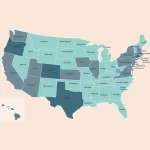Across the country, there are many folks who are pushing for legislative change pertaining to certain psychedelic substances currently under schedule I drugs. Psychedelics, such as psilocybin and MDMA, have shown promising results in treating mental health disorders, including depression, anxiety, and PTSD. As a result, state legislatures across the United States have begun introducing bills to legalize or decriminalize the use of these substances.
In this article, we will provide a comprehensive overview of the current state-wide efforts in the US regarding psychedelic legislation.
BLog POST
BLog POST
States that have passed psilocybin legalization bills
Oregon: In November 2020, Oregon became the first state to legalize the adult use of psilocybin. The state established a program to regulate the use of psilocybin for therapeutic purposes and the measure also calls for the creation of a regulatory framework for the use of psilocybin, including training and licensing requirements for facilitators. The program is expected to launch in 2023.
Colorado: Prop 122 passed to decriminalize personal use or giving away natural medicines for personal use without renumeration as well as to enact a regulated program for psychedelics via healing centers by September 2024.
Texas: Bill passed to allow for study of the efficacy of MDMA, psilocybin and ketamine for certain mental health conditions. The bill calls for the establishment of a clinical study program to investigate the potential benefits of these substances for conditions such as PTSD and depression.
Connecticut: Working group formed to study the health benefits of psilocybin in June 2021. Governor signed bill appropriating funds for psychedelic assisted therapy programs in May 2022. The bill also calls for the establishment of a task force to study the impact of psilocybin on public health and safety.
States with psilocybin legalization bills introduced
States across the US are beginning to introduce bills aimed at legalizing psilocybin for medicinal or recreational purposes. Here’s a closer look at the bills that have been introduced in different states and what they mean for the future of psilocybin legalization:
California: Senator Scott Weiner re-introduced Senate Bill 58 in December 2022 to legalize the possession, transportation, transfer, preparation, and obtaining allowable amounts of psilocybin, psilocyn, dimethyltryptamine (DMT), ibogaine, and mescaline (excluding peyote) for personal or facilitated or supported use by persons 21 years old or older. If passed, this bill would legalize the personal use of these substances, which could potentially pave the way for their future legalization and regulation.
New York: In January 2023, Assemblymember Rosenthal with others introduced a bill to legalize “adult possession and use” of psilocybin, psilocin, DMT, ibogaine, and mescaline (except peyote). Another bill is also in the works. If these bills were to pass, they would decriminalize the possession and use of these substances for adults and possibly set the stage for future legalization.
Washington: SB 5263 was introduced in January 2023, which would enact a regulatory system for adult use of psilocybin beginning January 1, 2024. However, this bill was later substituted to create a task force to study psilocybin instead. This task force will assess the potential benefits and risks of psilocybin use, as well as potential regulatory frameworks for psilocybin in the state.
Arizona: HB 2485 was introduced to appropriate $30 million to study psilocybin. This funding could potentially pave the way for future legalization and regulation of psilocybin in the state.
Utah: SB 200 was introduced to allow for medical production and use of psilocybin. This bill would legalize the use of psilocybin for medicinal purposes and could pave the way for future legalization for recreational use.
Kansas: HB 2465 was introduced to decriminalize the cultivation and possession of small amounts of psilocybin and reduce criminal penalties. If this bill were to pass, it would decriminalize possession and cultivation of psilocybin, potentially setting the stage for future legalization.
Iowa: HF 240 was introduced to remove psilocybin and psilocyn from schedule I under Iowa’s uniformed controlled substances act. If passed, this bill would remove criminal penalties for possession and use of psilocybin.
Illinois: The CURE Act was introduced to establish an advisory board for the purpose of advising and making recommendations to the Department regarding the provision of psilocybin and psilocybin services. If passed, this bill could potentially pave the way for future legalization and regulation of psilocybin.
Pennsylvania: HB 2421 was introduced and referred to the Health Committee to research psilocybin for therapeutic purposes. This bill could help to inform future legalization and regulation of psilocybin for medicinal or recreational use.
Virginia: SB 932 was introduced to establish an advisory board to “develop a long-term strategic plan for establishing therapeutic access to psilocybin services and monitor and study federal laws, regulations, and policies regarding psilocybin.” If passed, this bill could help to inform future legalization and regulation of psilocybin for medicinal or recreational use.
Massachusetts: Bills were introduced to remove penalties for adults to possess, ingest, obtain, grow, and give away without financial gain no more than 2g of psilocy, DMT, ibogaine and mescaline.
Connecticut: In Jan 2023, HB 5102 introduced to amend general statutes to permit medicinal and therapeutic uses of psilocybin.
Maryland: Bills introduced to decriminalize possession of de minimis amounts of certain controlled substances, and a separate bill to provide cost-free access to psychedelics for veterans suffering from PTSD or TBI.
New Jersey: Possession of 1 oz of less psilocybin has been decriminalized to a disorderly offense. A new bill introduced to, among other things, authorize production and use of psilocybin for therapeutic purposes.
New Hampshire: Bill to decriminalize adult possession of a certain amount of psilocybin has been tabled. Recent bill HB 328-FN introduced to legalize possession and use of LSD, mescaline, psilocybin, and peyote by someone 21 years of age or older.
Hawaii: Bill introduced creating a working group on therapeutic psilocybin, with amendment to make access to psilocybin/psilocyn dependent on FDA approval. Waiting on House.
Rhode Island: Bill introduced to decriminalize psilocybin and permit practitioners in good faith in the course of their professional practice to prescribe of dispense psilocybin as a therapeutic.
Current Status of Psilocybin Legalization in the US
As of May 2023, several states across the US have made progress towards psilocybin legalization. Oregon and Colorado have already legalized psilocybin for therapeutic use, while Texas and Connecticut have decriminalized possession of small amounts of psilocybin.
Additionally, several states including California, New York, and Washington, have introduced bills to legalize psilocybin for medical or therapeutic use. Other states like Utah, Kansas, Iowa, Illinois, Pennsylvania, Virginia, Massachusetts, Connecticut, Maryland, New Jersey, New Hampshire, Hawaii, and Rhode Island have introduced bills to decriminalize possession of psilocybin.
However, despite these efforts, psilocybin legalization still faces several challenges. One of the main challenges is the lack of understanding and stigma surrounding psychedelic drugs. Many people still view them as dangerous and addictive substances, which makes it difficult to gain support for legalization efforts.
Furthermore, the federal government still classifies psilocybin as a Schedule I substance, meaning it is illegal to possess or use under federal law. This creates a significant barrier to legalization efforts at the state level, as federal law can pre-empt state law.
Despite these challenges, there are also opportunities for psilocybin legalization. As more research is conducted on the therapeutic potential of psilocybin, public perception may begin to shift in its favor. Additionally, the growing trend towards cannabis legalization may pave the way for other psychoactive substances like psilocybin to follow suit.
Overall, while psilocybin legalization still faces several challenges, the progress made in recent years suggests that it may be only a matter of time before more states follow in Oregon and Colorado’s footsteps.
Conclusion:
In conclusion, the recent passage and introduction of psilocybin legalization bills across various states in the US indicate a shift towards more lenient attitudes towards psychedelic substances. While there are still significant challenges to overcome, such as federal scheduling and stigmatization, the progress made thus far is promising. Understanding the current legal landscape and potential implications of psilocybin legalization is crucial for anyone interested in the subject. As research continues to uncover the potential therapeutic benefits of psilocybin, it is important to continue advocating for safe and responsible access to these substances. The future of psilocybin legalization in the US remains uncertain, but it is evident that significant changes are on the horizon.







